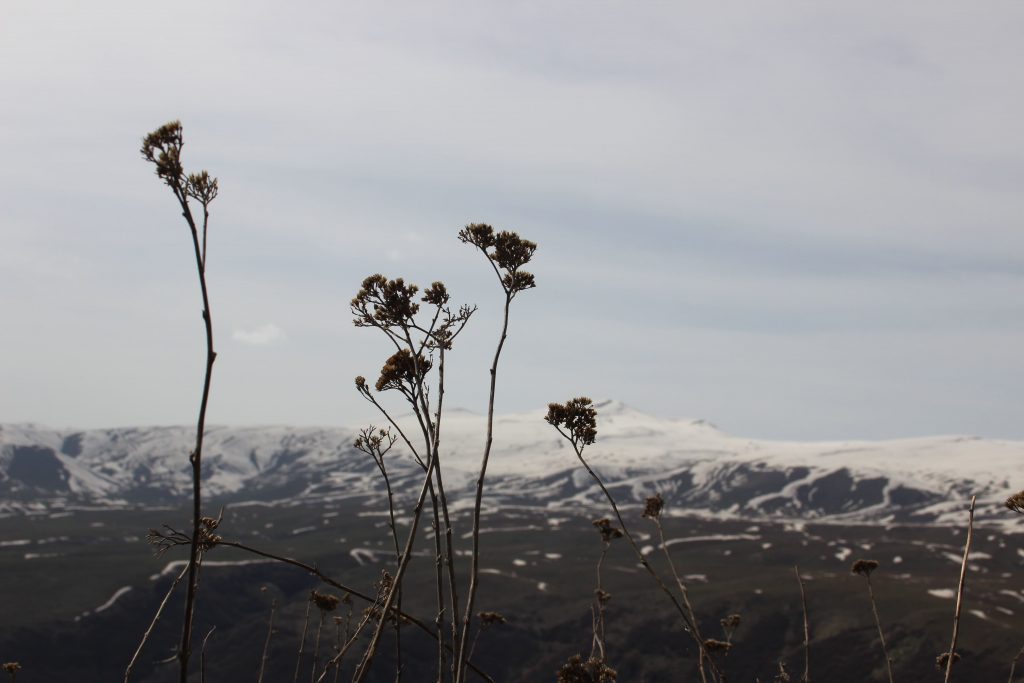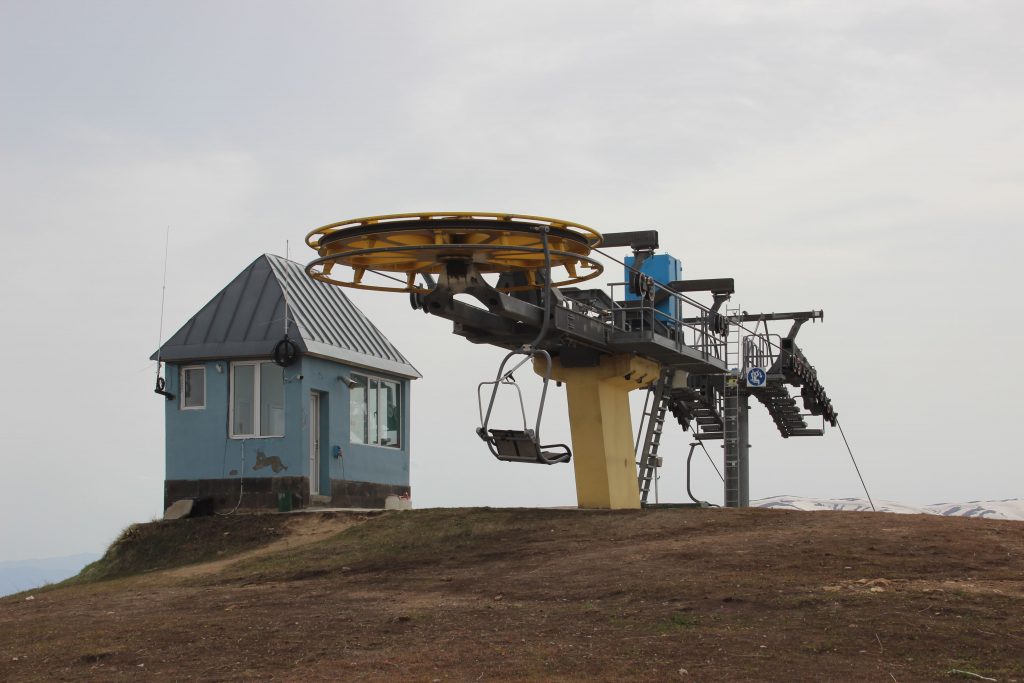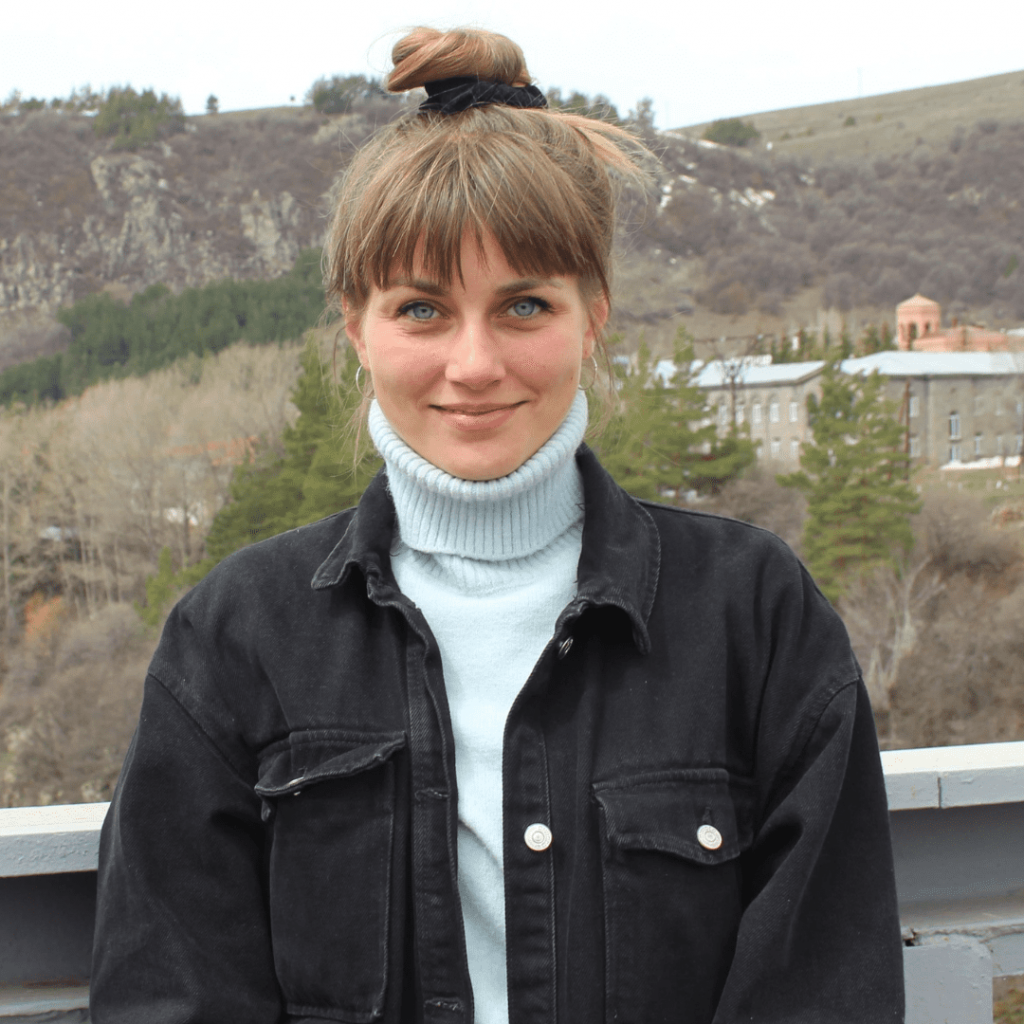This text is about encounters in Armenia. With acquaintances and strangers. The text uses these encounters to describe how hope and uncertainty make their way through everyday life in Armenia. Or perhaps even determine it.
by Anna Leidig
Yerevan, April 2022. My best friend in Armenia picks me up at the hostel and we drive through the city in her car. We have a lot to talk about as we have not seen each other for so long. We laugh together, we joke, we share common memories. And then, suddenly, out of nowhere, this sentence comes: “They say it could start again at any time…” Meaning the war. Meaning renewed attacks on Artsakh. The Republic of Artsakh, also known as Nagorno-Karabakh, has been declared independent since 1991 and is located southeast of Armenia. The mostly Armenian-populated area has been a reason for more than three decades of dispute between Armenia and Azerbaijan, which since the collapse of the Soviet Union resulted into armed conflicts and bloody clashes. After the last war in 2020, which began with attacks by Azerbaijan and is known as the 44-Day War, most of Artsakh’s territory passed under Azerbaijani control. My friend is a doctor; in the last war in 2020 she treated wounded soldiers and civilians in Yerevan. In the two-room flat where she lives with her two children and her husband, she had accommodated eight refugees in 2020. Sometimes she slept a little in the hospital’s on-call room after night duty as it was so cramped at home. It could start again at any time. The war has made it into everyday life.
April 2022, that is the time when many Russians come to Armenia: young men, worried about being drafted. People who are simply fed up with what is happening in their country. And many who are no longer able to do their jobs in IT from Russia. In the hostel I am one of the few who does not have a Russian passport. A small woman steps onto the balcony where I am standing with my coffee in the morning. She works in the hostel, washing dishes and making the rooms fresh for the next guests. We start a conversation and suddenly she says: “We get up here in the morning, then somehow we get through the day and what tomorrow will be, we can never know.” And then she tells me about her grown-up son who lives with her. He was in Artsakh during the war and has not slept properly since.
The fear of another outbreak of war around Artsakh is always there, I realize in April 2022. Armenia’s protecting power, Russia – which many in Armenia don’t want to call that, as Russian arms sales had reached both Armenia and Azerbaijan in 2020 – is fighting a war of its own right now. The concern is that Azerbaijan could take advantage of the ever-present attention the war in Ukraine is receiving. “Because nobody is looking right now, because nobody was looking in 2020,” they tell me.
A small village in Brandenburg, 13 September 2022. I am on holiday with my family, we are watching the 8 p.m. news, crows can be heard outside. Azerbaijan attacks Armenia. “They say it could start again any time!” My friend was right. Unfortunately. So now it has started, but this time in Armenia, not Artsakh. A new dimension of escalation, a new threat. Feeling queasy, I try to reach my friends. Some are in Jermuk right now, in the place where bombs are falling. They are safe, but shocked and at a loss. “Nstac spasum enq” – “We are sitting and waiting”, this is the text I read on my mobile phone.

I reach Yerevan at the end of September. Is it war or peace? People here ask themselves this question all the time. When I look out of the window of my rented flat near Komitas, everything seems so peaceful, so quiet, just like always. People dash across the street, cars honk, a cat searches in the rubbish for something to eat. At the side of the road, an old woman tries to bring “kanatchi” [fresh Armenian herbs] to the people, another sweeps the pavement with a small brushwood broom. And while everything seems as usual, so peaceful, I hear people talking so often about war: about the wars that have been and about the ones that might yet come for the small country in the Caucasus. Whenever I meet with my friends: sooner or later the war is the topic. Then it walks with us through the city, sits with us at Cascade, sits with us at the table. The future is uncertain.
Together with good friends I have a dinner date, the mood is jolly, we laugh and have a good time. The children are playing under the table, making little animals out of plasticine. Opposite me sits a young man whom I have not met before. “This is David, my best childhood friend,” says Tigran. David has been living in Russia for a few years, and now has a Russian passport; he gave up his Armenian one. Now he is back in Armenia: on the one hand, to avoid being sent to war in Ukraine, and on the other, to somehow be able to exchange his Russian passport for an Armenian one. “You’ll probably have to go to war in the end,” my friend next to me says. “Then I’d rather do it for Armenia,” he replies. In Moscow, his wife and 18-month-old daughter are waiting for him.
An acquaintance shows me her flat, which she is currently renovating: “Look, Anna, you can open the roof there and create an access to it. A small spiral staircase, for example. I plan to do that next year. Imagine, up there you can then make a little terrace and there you can do “khorovats” [Armenian BBQ] above the roofs!” her eyes glitter. And then she pauses for a moment. “Let’s see what the state of our country is like by then. Who knows!” The future is uncertain.
“The state of our country” keeps coming up, I get the impression that people in Armenia don’t plan far in advance. Or are able to plan. There is this uncertainty that always runs along, that questions every plan and every intention. The 44-Day War in 2020 set the country back at least a decade, a young mother tells me.

13 September, the day on which Azerbaijani bombs fell on Armenian territory this year, is also the birthday of Kristineh, who allowed me to interview her for this text. Kristineh is 40, grew up in Armenia and runs a small language school where she teaches mainly French, but also Armenian. When she married her French husband eight years ago, it was clear to everyone: Kristineh will move to France. But she didn’t, she didn’t even consider it, she tells me. She says she needs people who stay, people who don’t give up hope. After all, they managed a revolution in Armenia in 2018, forced the old leadership to abdicate with peaceful protests and achieved democratic elections. She was there, was on the streets, wanted to change something. She does not want to give up hope for her country, she says: “I imagine Armenia’s future in bright colors, that’s why I still live here. And I will stay here. Of course I could go to France, I could earn more there. […] But I really love Armenia very much.” Kristineh hopes to have children: “I will have children here, sons. And my sons will join the army and defend their country. […] Any mother who sends her son to the army knows that it can be a big problem.” A big problem. Meaning a new war, the son’s move to the front. Just as Kristineh’s mother had to fear for her son in 2020, Kristineh had to fear for her brother.
Kristineh cannot avoid answering the question about her vision of Armenia’s future with reference to the past. The relationship with Russia quickly becomes a topic. “Russia is not a protective power for Armenia, on the contrary. Russia is not a democracy, one cannot rely on such a state. Putin is afraid of democratic movements, as we have seen in Ukraine. Every country should be allowed to have its freedom and make its own decisions.” Kristineh describes her country as a “little corner of the world called Armenia.” And like all small countries, it is under the control of a big country, Russia, because “big countries love to play with small ones.”
And despite everything, she sticks to her words, emphasizing quite clearly at the end of our conversation: “There is hope for Armenia, there is a future for Armenia.” And this hope are the young people here, those who decide to stay. Because each and every one of them counts.
This article was published within the frames of “Correspondents in Conflict” Project,
implemented by Yerevan Press Club and Deutsche Gesellschaft e. V. The Project is
funded by the German Federal Foreign Office within the “Eastern Partnership Program”.
The contents of this article are the sole responsibility of the implementing partners and can in
no way be taken to reflect the views of the Federal Foreign Office. #civilsocietycooperation
 Anna Leidig has been enthusiastic about Armenia since she did a voluntary service there. She is currently studying for a master’s degree in Social and Cultural Anthropology and Sociology in Konstanz and is completing her thesis on the “Future Prospects for Armenia”. In addition to her studies, she works as an editor for a student magazine.
Anna Leidig has been enthusiastic about Armenia since she did a voluntary service there. She is currently studying for a master’s degree in Social and Cultural Anthropology and Sociology in Konstanz and is completing her thesis on the “Future Prospects for Armenia”. In addition to her studies, she works as an editor for a student magazine.












